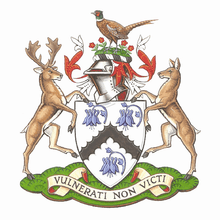Worshipful Company of Cooks
 | |
| Date of formation | 1482 |
|---|---|
| Company association | Cooks and food |
| Order of precedence | 35 |
| Motto | Vulnerati Non Victi |
| Website | www.cookslivery.org.uk |
The Worshipful Company of Cooks of London is the smallest of the Livery Companies of the City of London.
The Company received its first and incorporating Royal Charter − Edward IV − on 11 July 1482.
Its Royal Charter of 16 February 1663 − Charles II − is the present day governing ordinance for the Company.
Its origins can be traced back to the 12th century, founded from two guilds of cooks in medieval London − the Cooks of Eastcheap and the Cooks of Bread Street.
As you would expect from a Company whose roots can be traced back to 1170, the Worshipful Company of Cooks has a rich and colourful history from the earliest records of Cooks in the Middle Ages and their control of the craft until the 19th century to the Company’s current charitable works. Unusually for the male-dominated livery companies, the Cooks had freemaiden members in 1495.[1]
The Cooks Company is no longer an association of tradesmen in its original sense of control; yet, its membership today still includes craft tradesmen, and its activities engage with a broad range of organisations associated with cooking.[2] The Company's purpose in contemporary times has come to rest in a public search for the common good, to contribute as effectively as it can to the pursuit of a good society − to be socially useful. It does this through four principal objectives that translate its origins, history, traditions, affiliations, and activities into meaningful outcomes for today's world:
- To fund a range of charitable activities associated with the welfare and education of the catering trade
- To support the modern day craft of cooking including catering excellence through competition, scholarly and scientific culinary research, and the development of food policy
- To support the City of London
- To pursue a fellowship of association that can mobilise the necessary resource, skill, and wisdom to bring these about
The Cooks' Company ranks thirty-fifth in the order of precedence of Livery Companies.
Its motto is Vulnerati Non Victi, Latin for Wounded not Conquered.
References
1. A new history of the Company, written by Dr Alan Borg, was published in 2011: A History of the Worshipful Company of Cooks of London
- ↑ Engel, Matthew (December 21, 2012). "British institutions: livery companies". ft.com. Retrieved December 22, 2012.
- ↑ http://bubbl.us/?h=f404/19d03/62OcyMX579zh6
